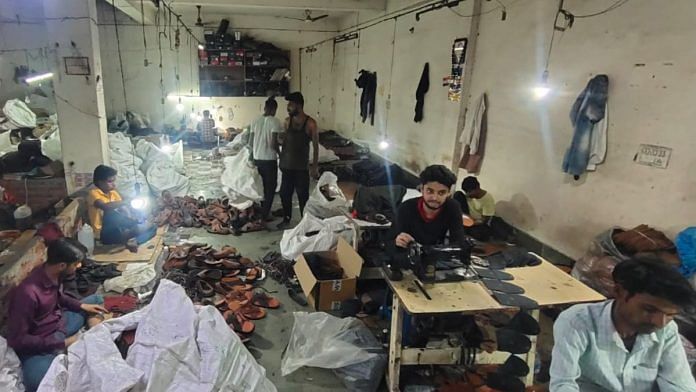Agra: Representatives from various footwear manufacturing organisations in Agra recently gathered for a meeting to express their discontent and criticism over the government’s decision to enforce ISI standardisation in the footwear production process.
The move, which requires ISI marks on all footwear priced above Rs. 150, has sparked concerns among small businesses in the cottage footwear manufacturing sector.
According to Somdatt Pippal, chairman of Kendriya Bhim Yuva Vyapar Mandal, the most affordable footwear in Agra is typically priced around Rs. 150 and experiences high demand, and since this type of footwear is primarily produced by multi-generational family-run cottage units; the production process lacks significant standardisation.
Imposing standardisation requirements on these units, Pippal added, would force them out of business as compliance with the standards would be challenging while maintaining their competitive price advantage.
He highlighted that the cost of obtaining the ISI certification process is prohibitive for cottage units. Additionally, the requirement for footwear to be manufactured in a factory setting poses challenges for these smaller workshops that do not meet ISI’s manufacturing standards.
Pippal noted that obtaining the mark can range from Rs. 50 to Rs. 100 per pair of shoes, which significantly impacts products typically sold within the price range of Rs. 150 to Rs. 200. Additionally, the ISI mark requires the use of specific materials, such as leather, which is more expensive compared to the synthetic materials often used by cottage units.
ISI standardisation could stifle innovation
Threatening to shut down the footwear manufacturing units in Agra and hand over their keys to the Agra MP and Union MoS for Health Prof. S P Singh Baghel, Upendra Singh Lovely, chairman of Agra Shoe Manufacturers Association said that there are multiple issues with this decision made by the government.
Lovely also highlighted that the expense of acquiring the ISI mark for each new footwear design can range from Rs. 5000 to Rs. 10000, depending on the size of the business. Given that small businesses often operate on narrow profit margins, this additional cost becomes a major financial challenge.
Pointing out another concern, he said that the ISI mark will lead to the standardisation of footwear, which could stifle innovation. The ISI mark is awarded to products that meet certain standards of quality and safety. This means that all footwear that bears the ISI mark will be of a similar standard. This could make it difficult for small businesses to differentiate their products from those of their competitors.
Financial aid could help
Amidst the concerns, Jitendra Trilokani, senior vice-president of the association have called for a tiered approach rather than a uniform imposition of the ISI mark requirement.
Trilokani suggested that the government could provide financial assistance to small businesses for obtaining the mark, relaxing the standards for smaller units, or introducing a separate ISI mark specifically for cottage footwear, which would be less expensive to obtain.
Delegates from organisations, including Agra Joota Laugh Udyog Utpadak Samiti and Agra Footwear Manufacturers and Exporters Chamber (AFMEC), warn of potential negative impacts, such as “financial burdens, product standardisation, and job losses” within the cottage footwear manufacturing sector.
Puran Dawar, chairman of AFMEC, however, provided some reassurance, stating that ongoing discussions with the Council for Leather Industries (CLE) and the Bureau of Indian Standards (BIS) aim to address concerns.
He clarified that, currently, the standardisation mandate applies only to manufacturers with turnovers exceeding Rs. 50 crores, while smaller manufacturers have been granted a six-month moratorium. The new rule’s remaining terms and conditions will be clarified in due course.
Agra has a lot of family-run cottage footwear units, and the standardisation will not apply to their products. The remaining terms and conditions in the new rule will be clarified soon, Dawar stated.
Also read: ‘This is Kalyug’: MSMEs, workers in shoe hub Agra say GST hike a kick in the gut after Covid



